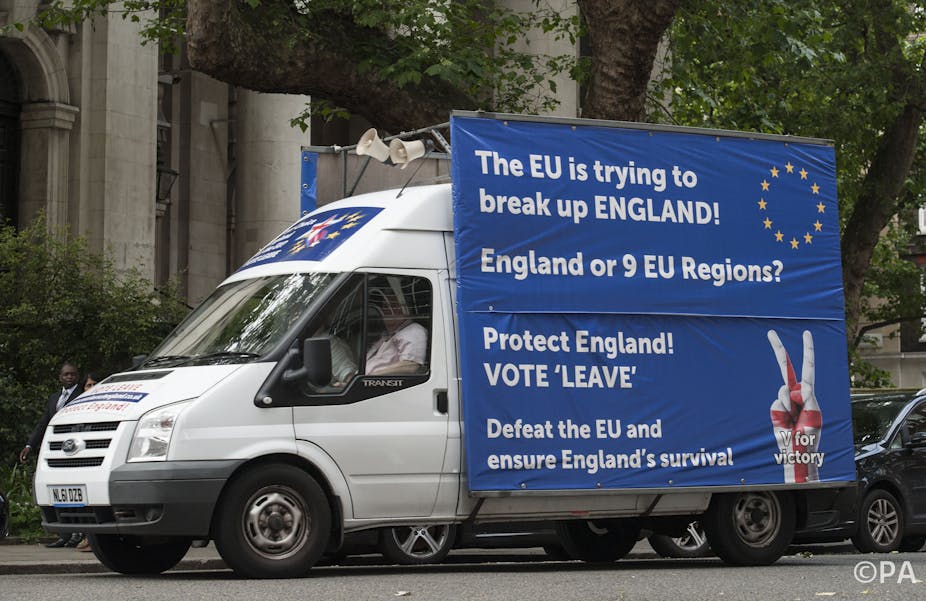The UK’s EU referendum campaign was played out on emotions, using strong emphasis on immigration, the economy and national sovereignty to sway voters. The feelings that dominated both sides were overwhelmingly negative, and served to highlight the divisive nature of the debate.
Voters, though often well-informed and politically aware, think “with their guts”.
The Brexit fight was split almost evenly down the middle, with voters forced to choose one way or another based on often confusing and conflicting facts from both sides. The media was frequently criticised of bias towards the Remain campaign, although in truth research found that more articles were skewed in favour of leaving the EU.
But no amount of reality checks or other articles addressing claims put forward by either side could fully override the electorate’s emotions. As Drew Westen, professor of psychology and psychiatry at Emory University, says, the “political brain is an emotional brain. It is not a dispassionate calculating machine, objectively searching for the right facts, figures, and policies to make a reasoned decision”.
Fear and loathing on the campaign trail

The entanglement of emotions and politics was apparent in the EU referendum from the outset. Writing just before debate kicked off in mid-April, the BBC’s chief correspondent, Gavin Hewitt, described the Leave campaign as an “appeal to the gut, and the heart”.
Both Leave and Remain were accused of widespread scaremongering: Leave capitalised on fear over immigration and the encroachment of the EU on national sovereignty, while Remain was accused of whipping up anxiety over the potential economic consequences of Brexit.
Fear was not the only negative emotion at play, however: analysis of the motivations of leave voters suggested that it was the disaffection and anger of working and lower middle classes towards the political establishment that swung the outcome. Groups who feel alienated from political elites have long been the targets of populist politics, and many scholars agree that the world post-recession has presented a particularly ripe moment for those seeking to drastically change the agenda.
On the day of the referendum, the journalist John Cassidy drew comparisons between the populist successes of Nigel Farage in the UK and Donald Trump in the United States: “Lacking grounds for optimism, and feeling remote from the levers of power, the disappointed nurse their grievances – until along come politicians who tell them that they are right to be angry, that their resentments are justified, and that they should be mad not just at the winners but at immigrants, too. Trump and Farage are the latest and most successful of these political opportunists. Sadly, they are unlikely to be the last.”
Anger is a powerful political emotion because it enables the collective expression of grievances that might otherwise remain personal and private. It is associated with irrationality, aggression and the potential for violence, and is therefore viewed as dangerous to democratic societies.
After the shock
Once the final result became apparent, anger and fear were supplemented by a new wave of pessimistic emotions. Remain voters went through the “seven stages of Brexit grief”, seeking to bargain against the result by signing a petition for a second referendum in their millions. But this sorrow and upset was not contained to the losing camp: leave voters in their droves expressed regret at the outcome – a feeling coined as “Bregret” and “Bregrexit”.

These emotions spilled over from public discourse into private lives. The vote caused bitter divisions in families split over the decision, particularly when it came to the generational divide in voting. Sarah Vine, Daily Mail columnist and wife of Leave campaign leader Michael Gove, wrote of how the recriminations of the losing camp had devastated her family life and mental health: “I felt as though I had fallen through a rabbit hole – lost in a strange land where nothing made sense any more.”
The negativity that has so dominated the EU referendum is a serious wake-up call about the depths of disaffection and division in society that will have to be addressed for constructive political debate to move forward. The experience of the campaign has shown that even if feeling and rationality may not be mutually exclusive, campaigners’ overriding reliance on negative emotions has had a detrimental impact on political decision making.
Emotions are still raw as the gravity of the decision gradually sinks in. The politics at the centre of the referendum cannot be ignored, and are unlikely to be overcome by reasoning and rationality. Rather, the way forward is to open a space for positive emotional politics, built on hope, tolerance, and empathy. They have driven social change for as long as political life has been around, and it’s time we used them once more.

